A day at the Kumbh Mela festival
- Published
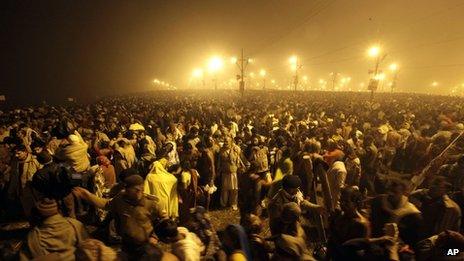
Millions of pilgrims have gathered for the festival
Monday marks the opening day of the Hindu festival of Kumbh Mela in the northern Indian city of Allahabad.
Tens of millions of pilgrims are expected to visit to bathe at the Sangam - the confluence of the Ganges, Yamuna and the mythical Saraswati rivers. The festival is scheduled to continue until 10 March and is billed as the biggest religious gathering in the world.
The festival has been held on the banks of the Ganges for thousands of years. It is at its largest once every 12 years when it attracts tens of millions of people.
The BBC's Geeta Pandey is in Allahabad, and has been giving regular updates on how the day progressed.
22:01 IST (16:31 GMT)
.jpg)
Hundreds of pilgrims still bathed at sunset
As the sun begins to set on Allahabad on a day that millions of Hindus believe to be very special, I head back to Sangam to meet the last few bathers.
Monica Vaish, a young high court lawyer from the city, is returning after a dip in the river with her extended family.
"I came here because my mother said I must have a bath now because this Kumbh is special. This Maha Kumbh is coming after 144 years. She said it won't happen again in my lifetime."
But Ms Vaish is unhappy with the quality of the river water. "It's very dirty. It was smelly. I'll have to have another bath once I get home," she says.
Before I set out for Allahabad, my cook Purnima asked me to get her a bottle of Ganges water. She is a devout Hindu who believes in the sanctity of India's pilgrimage centres and holy rivers.
At the river bank, where the pilgrims were bathing, the water appeared exceedingly muddy so I decided to hire a boat and went mid-stream in search of cleaner water.
From my boat, I could still see hundreds of pilgrims immersing themselves in the river, praying and imbibing a few drops of its water. For the faithful, Ganges is sacred and even if its water is polluted, it is still to be accepted as the blessings of the river goddess.
14:30 IST (09:00 GMT)
The volunteers at the lost and found camp at the Kumbh Mela have had a busy morning.
They have made non-stop announcements about lost people - and where they can be found - since I arrived at the grounds soon after 04:00 IST (22:30 GMT).
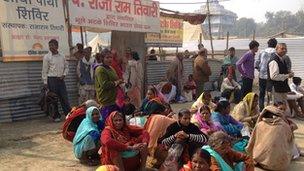
Raja Ram Tiwari's lost and found camp has already reunited thousands who got separated from family
By mid-day, at Raja Ram Tiwari's Khoya Paya Shivir (Lost and Found Camp), some 4,300 lost people have turned up.
The octogenarian has an impressive record of reuniting people who get lost at the Kumbh Mela - he set up his first camp in 1946 and has covered five Maha Kumbh festivals (which fall once in 12 years), six half-Kumbh and 56 Magh melas that are held every January.
So far, he has helped reunite more than one million lost adults and 20,000 children with their families.
On Monday, he has 50 volunteers working for Bharat Seva Dal, his non-governmental organisation, scouring the grounds for anyone who looks lost, bringing them to the camp and making announcements.
"We have managed to reunite most of the lost people with their families, but we still have about 150 people waiting," says Mr Tiwari's son, Umesh Tiwari, who is taking over the running of the camp from his father.
He says that it's mostly the women or the elderly who get separated from their families during the bathing.
At the camp, I met Ram Lal who has made several announcements for his missing wife, Raj Kumari.
"We went for a bath and in the crowd, we got separated. I couldn't find her. I've been waiting here for several hours, we've made announcements for her, but there's no sign of her. I hope she's alright," he says anxiously.
11:00 IST (05:30 GMT)
The crowd management at the river front so far has been impressive.
.jpg)
Pilgrims give alms to children dressed as Hindu gods at the Kumbh Mela
As soon as pilgrims finish bathing, they are encouraged to move away and make space for other bathers.
A group of 100 pilgrims from Udaipur in Rajasthan tell me that although the Sangam was very crowded, "we had a good bath".
A little away from the river front, the mela area is bustling with small roadside vendors selling tea, sweets, colourful photographs of Hindu deities and small round white candies generally offered at the temple altar.
On one street, several toddlers dressed as Hindu deities sit by the roadside as many passing pilgrims hand them coins.
"Their parents are very clever," an old man tells me, "for who can refuse alms to a pretty child dressed as a god or goddess?"
08:56 IST (03:26 GMT)
As waves of naked ash-smeared ascetics continue to arrive and sprint towards the river, thousands of bathers in nearby enclosures watch in awe.
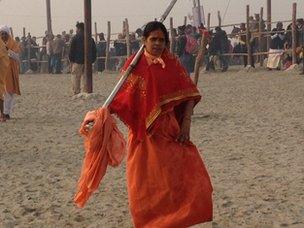
Women ascetics are also taking part in the Kumbh Mela
One sadhu, with long matted hair, stops and does a joyous jig for the furiously clicking cameras.
In a departure from tradition, a large number of women ascetics have also come for a bath at Sangam. Dressed in bright saffron-coloured saris and robes, they seemed to be enjoying all the attention. Some laughed and chatted amongst themselves, some even posed for pictures.
Meanwhile, in the next enclosure, thousands of ordinary pilgrims - men and women, old and young - are moving in orderly lines for their bathing rituals.
Deemaan Singh of Gwalior says he will come at least two more times before the 55-day Kumbh Mela is over.
07:33 IST (02:03 GMT)
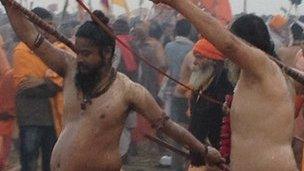
The Niranjani akhara has a reputation for being unfriendly
The sadhus from the Niranjani akhara (camp) arrive in a huge procession.
The group, which has several hundred naked ascetics, has a reputation for being rather unfriendly and they are accompanied by the elite commandos of the RAF (rapid action force). The pesky journalists are reined in behind police lines "for your own protection," we are told.
The group gets 45 minutes to bathe after which they are escorted out by the RAF troops.
06:44 IST (01:14 GMT)
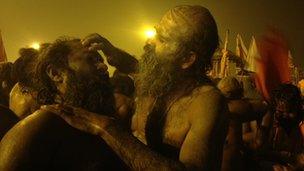
Sadhus on the banks of the river: "Try it for yourself!"
The first group of Naga sadhus (ascetics) arrived in a colourful procession. Led by naked ash-smeared men with marigold garlands around their necks, they sprinted into the chilly waters of Sangam.
Dip over, some came and stood before us in the media enclosure, rubbing coarse river sand onto their bodies.
I asked an old sadhu if he felt the cold. "Not at all," he said and handed me some sand: "Try it for yourself!"
05:17 IST (23:47 GMT)
At 5am, Sangam is a hub of frantic activity. Thousands of pilgrims have already taken a dip in the holy waters, thousands are lining up for their turn and thousands more are walking towards the river front.
Although the sky is still dark, the bathing ghats are lit up with thousands of electric bulbs.
The air here smells smoky from all the fires which people have burned overnight to stay warm.
Among the early bathers was Manidatt Panda from Nepal. "I've washed off my sins," he said, laughing.
- Published11 January 2013
- Published2 September 2012